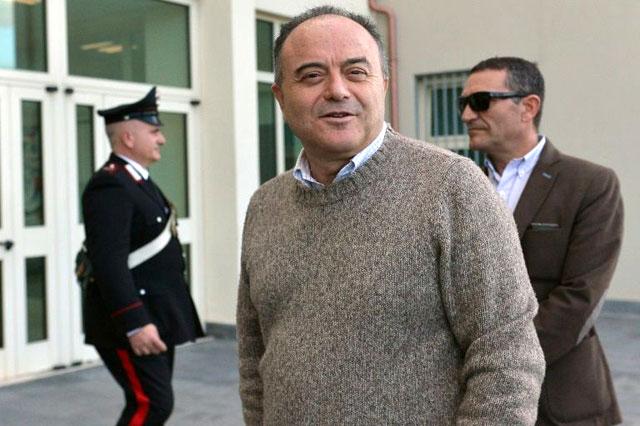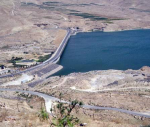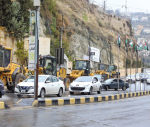You are here
Italy battles crescendo of corruption scandals
By AFP - Jun 23,2014 - Last updated at Jun 23,2014
ROME — From a bribery racket in Venice to accusations of contract rigging in Milan and mafia infiltration of the judiciary, Italy is engulfed by a wave of corruption scandals which have raised the spectre of depravities past.
Reports of widespread graft in northern Italy in particular have drawn comparisons with Italy's "Clean Hands" investigations of the 1990s, which saw top politicians jailed and swept away the country's postwar party system.
Two decades on, Italy still comes third-to-last in Transparency International's European rankings — ahead of just Bulgaria and Greece — and corruption costs the taxpayer some 60 billion euros ($80 billion) per year.
The economic crisis which sank Italy into its worst postwar recession "makes these fresh scandals even more intolerable in the eyes of the citizens", Michelangelo Anderlini, Transparency's deputy head in Italy, told AFP.
Prime Minister Matteo Renzi, who came to power in February, has pledged to make inroads into corruption, seen as a significant stumbling block in attracting foreign investors to the eurozone's third largest economy.
The International Monetary Fund (IMF) urged him to make good on his promises as soon as possible, advising in particular the reversal of legal reforms brought in by former premier Silvio Berlusconi which decriminalised false accounting.
Renzi — nicknamed the "Demolition Man" for vowing to shake up the system and oust the old guard — announced last week he was boosting the powers wielded by his top anti-corruption czar, magistrate Raffaele Cantone.
Cantone, famed for investigations against the powerful organised crime group Camorra, has called for a "real political and cultural change", describing corruption as "like the mafia. When no-one talks about it, it is prospering".
"To really achieve clean hands, we have to get hands out of pockets," he said.
'Bribesville is back'
The Council of Europe's anti-corruption group (GRECO) said on Friday that Italy was taking important steps, but described as "quite disappointing and hard to understand" why such slow progress had been made in casting the net wider to cover more corruption offences.
The mayor of Venice, Giorgio Orsoni, was forced to resign last week amid a sweeping probe into a multi-billion-euro flood barrier project, after police said they had traced some 20 million euros ($27 million) in kickbacks.
Prosecutors are also investigating allegations of wide-scale contract rigging for the 2015 world fair Expo in Milan, and last month they arrested seven businessmen and politicians suspected attempting to influence public tenders.
Two of those under investigation did time behind bars in the early 1990s for corruption, a revelation which sparked headlines in Italy warning that "Bribesville is back".
President Giorgio Napolitano waded into the fray Thursday, urging the financial police to do more — less than two weeks after their own second in command came under investigation in a tax rigging probe.
And the justice system also came under scrutiny after a mafia boss-turned-informant accused judges in Naples of having accepted bribes to acquit him of murders he has confessed to carrying out — sparking a police probe.
Even Pope Francis has referred to the scandals hitting the headlines, denouncing "the corrupt politician, the corrupt businessman, the corrupt priest", saying it was "the poor who pay for the parties of the corrupt. The bill goes to them".
Bruno Manfellotto, editor of the weekly L'Espresso magazine, said the difference between "Clean Hands" and today's rackets is that the latter "involve not just politicians and the odd rotten apple from the public sector, but ministers, undersecretaries, magistrates, the financial police... and secret services".
"Such a vast network of friends, and friends of friends" seems to be aimed at creating a system "to warn them of approaching trouble, mislead investigations, and shut overly-curious eyes," he added.
The IMF stressed that Renzi must rapidly enact labour reforms and clean up corruption to boost weak growth in the eurozone's third-biggest economy.
Despite a pickup in private consumption and exports, "the recovery remains fragile and unemployment unacceptably high, highlighting the need for bold and quick policy actions," the IMF said in a report after a visit to Italy.
Italy's economy shrank by 0.1 per cent in the first quarter of 2014 after officially pulling out of its worst post-war recession at the end of last year.
Official data, including a rise in industrial production, showed growth should pick up again in the second quarter.
Renzi — who became premier in February — has pledged repeatedly to modernise Italy, clean up its political system and tackle record unemployment, though few have seen the light of day.
"Delivery of real change is now crucial for strengthening confidence and support for reforms," the IMF emphasised.
The IMF also highlighted "fiscal rebalancing to allow lower tax rates and increased productive spending", as key to turning around Rome's fortunes.
The international body said reforming government policy on labour and competition, providing more support to small and medium enterprises and cleaning up the judicial system would all help to boost growth.
On workers rights, the IMF said Italy's temporary roles, which have been criticised for stripping workers of their rights, should be replaced by contracts that increase job protection for workers.
Reforms from 2012 to clean up corruption have helped but "could be further improved, notably by criminalising the false accounting offense and changing the limitation period provisions", it added.
The body also praised Italian banks for making progress in precognising losses, reforming governance and raising private capital, but warned on the slow pace of write-offs.
Related Articles
An overhaul to slim down and speed up Italy's overweight bureaucracy will help boost "all-out structural reforms", Finance Minister Pier Carlo Padoan said this week.
ROME — After years of investigation, mountains of evidence and hundreds of suspects, Italy's plucky anti-mafia prosecutor Nicola Gratteri is
ROME — The president of Italy's northwest Liguria region and the ex-head of Genoa Port were arrested on Tuesday in a sweeping anti-corruptio
















